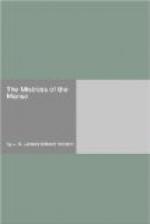Our fruit grows dead in pulp and rind
When seen and handled overmuch;
The roses fade, our fingers bind;
And with familiar kiss and touch
The graces wither from our kind.
Man lives on love, at love’s expense,
And woman, so her love be sweet;
Best honey palls upon the sense
When it is tempted to repeat
Too oft its fine experience.
And Mildred, with instinctive skill,
And loving neither most nor least,
Stood out from Philip’s grasping
will,
And gave, where he desired a feast,
The taste that left him hungry still.
She hid her heart behind a mask,
And held him to his manly course;
One hour in love she bade him bask,
And then she drove, with playful force,
The laggard to his daily task.
They went their way and kept their care,
And met again their toil complete,
Like angels on a heavenly stair,
Or pilgrims in a golden street,
Grown stronger one, and one more fair!
V.
As one worn down by petty pains,
With fevered head and restless limb,
Flies from the toil that stings and stains,
And all the cares that wearied him,
And same far, silent summit gains;
And in its strong, sweet atmosphere,
Or in the blue, or in the green,
Finds his discomforts disappear,
And loses in the pure serene
The garnered humors of a year;
And sees not how and knows not when
The old vexations leave their seat,
So Philip, happiest of men,
Saw all his petty cares retreat,
And vanish, not to come again.
Where he had thought to shield and serve,
Himself had ministry instead,
He heard no vexing call to swerve
From larger toil, for labors sped
By smaller hand and finer nerve.
In deft and deferential ways
She took the house by silent siege;
And Dinah, warmest in her praise,
Grew, unaware, her loyal liege,
And served her truly all her days.
And many a sad and stricken maid,
And many a lorn and widowed life
That came for counsel or for aid
To Philip, met the pastor’s wife,
And on her heart their burden laid.
VI.
He gave her what she took—her
will;
And made it space for life full-orbed.
He learned at last that every rill
Loses its freshness, when absorbed
By the great stream that turns the mill.
With hand ungrasping for her dower,
He found its royal income his;
And every swiftly kindling power—
Self-moved in its activities—
Becoming brighter every hour.
The air is sweet which we inspire
When it is free to come and go;
And sound of brook and scent of briar
Rise freshest where the breezes blow,
That feed our breath and fan our fire.
That love is weak which is too strong;
A man may be a woman’s grave;
The right of love swells oft to wrong,
And silken bonds may bind a slave
As truly as a leathern thong.




